Feeling unappreciated is your lot as a writer. Few readers; no readers. Scathing reviews; no reviews. Publishers saying, “Don’t call us, we’ll call you” or not taking a punt on your second book because the first sold poorly. The fat American and English imports on display at the front of many bookshops, a tiny Australian section in the back corner. Beverley Farmer finding her short-story collection Milk shelved with books on nursing mothers; me finding my novel The Stencil Man shelved in Art and Craft.
Most of these indignities occur while you’re still at your desk. They multiply once you appear in public. Elizabeth Jolley, signing books at a department store in Perth, was scrutinised by a beady-eyed woman who eventually approached and asked, “How much is the table?” A bookseller stuck the first page of a US thriller under my nose and said, “Once you can learn to write as good as this …”
What can you do but smile and shrug inwardly? People and their funny ways. But then you might be asked to account for what you write, even take a moral stance on it.
My books are popular in Germany and Switzerland, where I’ve won the prestigious Deutsche Krimi preis for crime fiction three times. I enjoy touring there, crisscrossing by train, talking to polite, well-read audiences in bookshops, halls and cultural centres. The format never varies: I’ll read a section in English, a popular stage or TV actor will follow with the German translation (I doubt I’m the main drawcard), and a moderator will converse with me and translate as required.
I once asked a German academic why my crime novels (and Jane Harper’s, and Michael Robotham’s) are popular in Germany. He argued from the general to the specific: books of all kinds matter in Germany, German readers embrace translations, German crime writing is underdeveloped, and Australian settings have an exotic appeal. And one of my characters, Wyatt, an armed holdup man, is popular because German people – obedient, respectful and well-ordered – secretly want to be like Wyatt, a man not hemmed in by doubts and scruples, rules and regulations. This chimes with what an Australian reader told me: “I don’t approve of Wyatt, but I want him to win.”
A woman in Bern was having none of it. A psychiatrist, elderly, stern-faced, beautifully dressed, she said surely I didn’t condone Wyatt’s actions? I replied that judgment didn’t come into it. My job was to entertain, not provide moral lessons. She didn’t accept that and pursued me even to the dinner organised by the local literati. She wouldn’t leave until I said that of course I didn’t approve of murder and mayhem. I’ve often thought about her. Perhaps she didn’t read fiction – many readers don’t, because it isn’t real. Or perhaps she’d treated crime victims or was herself a victim. To someone for whom crime has a terrible resonance, a writer who treats it blithely might need to be challenged. Perhaps my life has been sheltered and hers the real thing.
Should I have to account for myself? Do I have obligations beyond entertaining readers, giving them their money’s worth (thrills, thought-provoking ideas, graceful prose or anything else)? I genuinely don’t know, but every now and then I encounter people for whom a story is not just a story; who cannot suspend disbelief. They’ll ask, “How can you write about such terrible things?” If I say, “It’s just a story,” they’re not satisfied. If I say, “Worse things happen in real life than I could ever invent, just read a daily newspaper”, I learn that they don’t read newspapers because newspapers report terrible things – and why would I want to reinforce those terrible things? Do I reply that, as far as I know, no one has committed a crime after reading one of my books? (Thrown it across the room, maybe.)
One is brought down to size in myriad ways. Signing books alongside Michael Connelly, Ian Rankin or Kerry Greenwood, for example. Guess whose queues stretch across the room, out the door and around the block? Time passes. You’re mute. No one makes eye contact. Your signing hand lies idle. But then you might be healed: a warmly smiling figure will loom and prove to be knowledgeable about your backlist or to have attended primary school with you, or the very-long-queue author beside you, busily signing Forbidden Love after treating you to a disdainful sniff because she’s never heard of you, is later unmasked as a literary fake.
There’s nothing better than mixing with readers though. I meet people who no longer confuse me with Gary Crew, my signing queues might even reach the tea urn these days, and I’ve come to treat everyone’s questions with respectful consideration – even “Where do you get your ideas from?”
